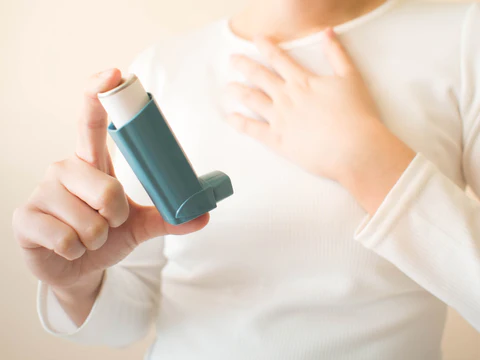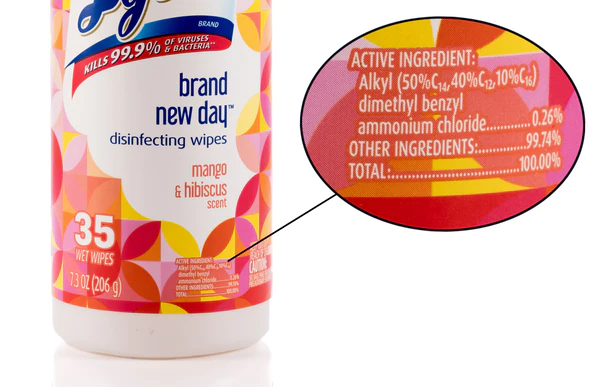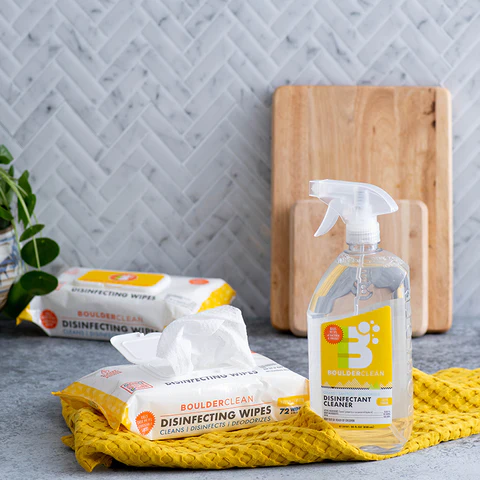What You Need To Know About Quats
STOP THE QUAT ™
At Boulder Clean we are committed to helping you make your home cleaner and greener. As such, we only use ingredients that will not harm your home or your health. Not every company in the cleaning industry shares the same sentiments, and they choose to use ingredients (like Quats) that are NOT safe for use.
With the recent launch of our plant-based Disinfecting Wipes, you might have seen us mention the term, or using the hashtag #stopthequat. But we’d like to take a deeper dive into Quats, as they are one of the most controversial ingredients found in household cleaning products like disinfectant sprays, disinfectant wipes, antibacterial soaps and toilet cleaners.
But before we do, we’d proudly like to make note that all the products in our disinfecting line are free from quats, bleach, alcohol, triclosan and ammonia. Yet, they still tackle the toughest of messes and help stop the spread of over 99.9% of germs (including cold and flu viruses*). They are also EPA Registered and on List N: Disinfectants for Use Against SARS-CoV-2 (COVID-19).
What Are Quats?
Most simply put, quats or QAC (short for quaternary ammonium compounds) are antimicrobial chemicals. They are often found in disinfecting sprays and wipes as they work effectively well to kill bacteria, viruses, molds and fungi on hard, non-porous surfaces. Sounds like exactly what you’d want in your disinfectant, right? Actually, no!
So what’s the problem?
While quats can effectively work to disinfect surfaces, there are serious potential side effects that comes along with that cleaning power. Quats are powerful irritants. In fact, the EPA has officially registered quats as pesticides. They are actually toxic and can be very harmful to your health. So, disinfectants containing quats are the last thing you want in your home and around your family and pets!

How Are Quats Harmful?
In a recent article from The Wall Street Journal, Karin Pacheco an allergist at National Jewish Health explains, “Both bleach and quats are considered safe if used as directed. But if inhaled, they may cause irritation in some people, at times resulting in sneezing, coughing or shortness of breath. In some cases, users may develop a sensitivity to the chemicals over time. If you inhale irritants in a high enough concentration, you can cause asthma or upper respiratory problems.”
Additional adverse health effects linked to quats:
• Dermatitis (skin rashes)
• Chronic Respiratory Conditions
• Decreased Lung Function
• Possibility of Birth Defects
• Fertility Issues
• Reproductive Harm
Widespread use of quats also contributes to the global problem of antimicrobial resistance. This is a major concern, especially among those that work in medicine, because it can lead to the development of “superbugs” that are resistant to antibiotics.

How do you know a quat when you see one on a label?
Quaternary ammonium compounds are a class of chemicals that have numerous names and synonyms. Commonly found quats in household products may be listed as:
- Benzalkonium chloride
- Benzethonium chloride
- Alkyl dimethyl benzyl ammonium chlorides (C12-16)
- Alkyl dimethyl benzyl ammonium chloride (C14 60%, C16 30%, C12 5%, C18 5%)
- Alkyl dimethyl ethylbenzyl ammonium chloride (C12-14)
- Alkyl dimethyl ethylbenzyl ammonium chlorides (C12-18)
- Didecyldimethylammonium chloride
- Dioctyldimethylammonium chloride

What Should You Do If You’re Worried About Exposure To Quats?
First and foremost, you should try to AVOID products that contain quats and even bleach.
Unless you plan on doing some open-heart surgery on your kitchen table, there is no need for quats to sterilize the surfaces in your house- in most cases, quats are total overkill for your everyday household cleaning needs. Alex Scranton, Director of Science and Research at Women’s Voices For the Earth (WVE) says, “It’s like killing a housefly with a sledgehammer – there is no question the sledgehammer will be very effective (with a direct hit) but the side effects (the gaping holes in your wall) are pretty unpleasant, not to mention unnecessary.
Always read labels, and check the full ingredient list of a product before use. Boulder Clean’s disinfecting products only use botanically derived ingredients– they are 100% non-toxic, free of bleach, quats and alcohol. They’re better for you and your home and ultimately safer than other disinfectants on the market like Clorox and Lysol that use quats.
If you find yourself in a situation in which you have to use products containing quats or bleach, make sure you are in a “properly ventilated rooms to lessen exposure”, Karin Dr. Pacheco says, “and avoid contact with the skin, wear gloves and don’t inhale this stuff.” (This is one reason why packages of antibacterial wipes strongly recommend washing your hands after use. A factor that really takes the convenience out of using a wipe in the first place!)
The other thing is that quats will linger on a surface long after you have cleaned with them. This means that your exposure (and your kids’ exposure, and your pet’s exposure) continues every time you touch that countertop. Again there is a reason that disinfectant wipes with quats also recommend against using them on any food-contact surfaces (like cutting boards, plates or cutlery, high chair trays etc.) because these potent chemicals can contaminate the food they come into contact with, even well after cleaning is done.
The EPA recommends using non-aerosol sprays or wipes to reduce inhalation exposure at home. Keep in mind that while bleach has a distinct odor, quats don’t, so isn’t always evident if a disinfecting product was used recently on a surface you are touching.
